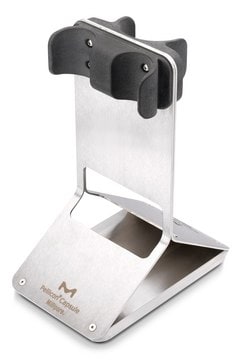1.00165
Boric acid
for analysis EMSURE® ACS,ISO,Reag. Ph Eur
Synonym(s):
Orthoboric acid, Trihydroxidoboron
About This Item
Recommended Products
grade
ACS reagent
Quality Level
Agency
reag. ISO
reag. Ph. Eur.
suitable for SM 4500 - NH3
suitable for SM 5210
vapor pressure
2.6 mmHg ( 20 °C)
product line
EMSURE®
Assay
99.5-100.5% (alkalimetric)
form
solid
potency
2660 mg/kg LD50, oral (Rat)
>2000 mg/kg LD50, skin (Rat)
impurities
≤0.005% In methanol insoluble matter
≤0.05% Nonvolatile with methanol
pH
3.8-4.8 (20 °C, 33 g/L in H2O)
mp
160 °C (dec.) (lit.)
solubility
49.2 g/L
density
1.489 g/cm3 at 23 °C
bulk density
400‑600 kg/m3
anion traces
chloride (Cl-): ≤0.0003%
phosphate (PO43-): ≤0.0005%
sulfate (SO42-): ≤0.0005%
cation traces
Ca: ≤0.002%
Fe: ≤0.0001%
Pb: ≤0.001%
heavy metals (as Pb): ≤0.0005%
storage temp.
2-30°C
SMILES string
OB(O)O
InChI
1S/BH3O3/c2-1(3)4/h2-4H
InChI key
KGBXLFKZBHKPEV-UHFFFAOYSA-N
Looking for similar products? Visit Product Comparison Guide
General description
Application
- For the determination of the protein content of yogurt samples.
- In the proximate analysis of seaweed Caulerpa sp. samples.
Features and Benefits
- Most extensive specifications worldwide
- Tested for up to 70 parameters
- Extraordinary purity
- Very low limiting values
- Greater accuracy and control of analyses
- Optimized for highly critical and demanding analyses
- Ideal for method development
- No interference or contamination due to unknown impurities
Analysis Note
Identity: passes test
Appearance of solution: passes test
pH-value (3.3 %, water): 3.8 - 4.8
Chloride (Cl): ≤ 0.0003 %
Phosphate (PO₄): ≤ 0.0005 %
Sulfate (SO₄): ≤ 0.0005 %
Solubility in ethanol: passes test
In methanol insoluble matter: ≤ 0.005 %
Heavy metals (as Pb): ≤ 0.0005 %
Ca (Calcium): ≤ 0.002 %
Fe (Iron): ≤ 0.0001 %
Pb (Lead): ≤ 0.001 %
Organic impurities: passes test
Nonvolatile with methanol: ≤ 0.05 %
Corresponds to ACS,ISO,Reag. Ph Eur
Legal Information
Signal Word
Danger
Hazard Statements
Precautionary Statements
Hazard Classifications
Repr. 1B
Storage Class Code
6.1D - Non-combustible acute toxic Cat.3 / toxic hazardous materials or hazardous materials causing chronic effects
WGK
WGK 1
Flash Point(F)
Not applicable
Flash Point(C)
Not applicable
Certificates of Analysis (COA)
Search for Certificates of Analysis (COA) by entering the products Lot/Batch Number. Lot and Batch Numbers can be found on a product’s label following the words ‘Lot’ or ‘Batch’.
Already Own This Product?
Find documentation for the products that you have recently purchased in the Document Library.
Customers Also Viewed
Related Content
This page is intended to make it easier to find the consumables you need based on the analytical method you’re using. Methods included on this page come from the EPA, Standard Methods and ASTM.
This page is intended to make it easier to find the consumables you need based on the analytical method you’re using. Methods included on this page come from the EPA, Standard Methods and ASTM.
This page is intended to make it easier to find the consumables you need based on the analytical method you’re using. Methods included on this page come from the EPA, Standard Methods and ASTM.
This page is intended to make it easier to find the consumables you need based on the analytical method you’re using. Methods included on this page come from the EPA, Standard Methods and ASTM.
Our team of scientists has experience in all areas of research including Life Science, Material Science, Chemical Synthesis, Chromatography, Analytical and many others.
Contact Technical Service


